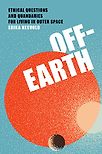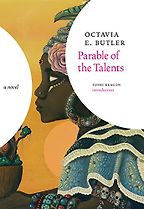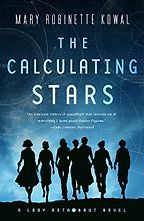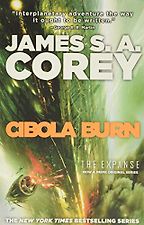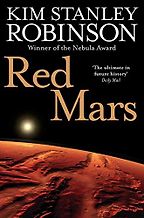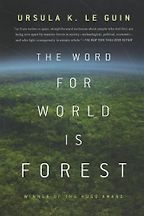Space settlement is definitely on a lot of our minds these days, but what’s the history of it in literature? Have humans been thinking about settling in space for as long as we’ve been looking at the stars?
They certainly have. It’s actually really fun for me to go back and read the older science fiction, when we hadn’t studied the planets enough yet to understand what it would be like to actually stand on the surface. And so, we get the most interesting stories about what it would be like to walk around on a rainy Venus or look at the water-filled canals of Mars. That always delights me.
You can track through science fiction as we learn more about the planets. You can see the stories and the imagined experience evolve as you go forward in time. It’s pretty cool.
Let’s start with your first selection for us, Parable of the Talents by Octavia Butler, who was the first science fiction author to win a MacArthur “Genius Grant.” Can you tell us a little more about this classic novel?
This is actually a duology, the Parable of the Sower is the first one and the Parable of the Talents is the second one. Sadly, Octavia Butler intended to continue this into a longer series and she didn’t, so this is kind of a cheat selection because the characters in these books never actually get seen in space. The second book ends with some of them launching to begin space colonization.
But I really wanted to include it because it does a really good job of capturing some of the arguments of why we should settle space, and also interrogates these arguments.
The main character of the first book, who is also one of the main characters in the second book, is growing up in this very-slow-climate-apocalypse-on-Earth society. The US is really falling apart and she is struggling to survive. At the same time, she is looking at the stars and she is creating her own religion, essentially, arguing that our destiny is to go out and colonize the stars.
This is an argument that exists in real life, and I criticize it in my book, but I think Butler presents and frames it really well: why someone growing up in a terrible world like this—more terrible than ours but very similar—would still have hope for a future in space.
Then, in the second book, Parable of the Talents, the main character’s daughter really presses her on this and says, ‘Is this what we need to be focused on? There are people starving on Earth. Why don’t you pay attention to me, your own daughter, instead of this dream of space?’ And I think those are also questions worth asking.
You mentioned criticizing that idea, can you tell us a little more about your critiques or concerns about the idea of space as our destiny or salvation?
I think it’s fascinating that you run into these really technical, science-based people who would not dream of inventing their own religions, who often bring up this argument, that it’s humanity’s destiny to go out and colonize the stars. That’s really weird to me because destiny is a very religious argument.
So I think anyone who is using that argument, but also thinks of themselves as a rational analytical person, should take a moment to think about: what does that mean? Is it just my own idea, emotionally, of what I think humanity’s destiny should be? Is it based on real science? Does it represent the way everyone on earth actually feels about our place in the universe?
Not to say that you’re going to decide that you are wrong and we shouldn’t settle in space, but it’s worth questioning because how we act in space is going to be based on what our motivations are for going out there. So if you think it’s our destiny to go out and reproduce as much as possible, or grab as many resources as possible, that’s going to affect how we treat the places that we go to and how we treat each other.
Octavia Butler is incredible at building these complex moral questions into her work, and really rendering how different characters respond to those quandaries.
Yes, she both builds a world where things are realistically falling apart and also does such an amazing job of showing the mindset of the people growing up and trying to survive in that world in different ways.
So some of her characters—including the main character in Parable of the Talents—really turn that into an ambition for something more. Others turn it into an ambition just to protect themselves and their loved ones. Others decide to just survive at all costs, even if that means hurting other people.
Let’s segue from that to your next selection, which is The Calculating Stars by Mary Robinette Kowal. This came out in 2019 and won both the Hugo and the Nebula awards.
The Calculating Stars is part of Mary Robinette Kowal’s Lady Astronaut Series, which was a book and then a duology and then a trilogy, so I think at this point we should just call it a series.
It’s a really fascinating piece of almost-historical fiction about space colonization, which is weird to say because we haven’t actually colonized space historically. It’s an alternate history where in the 1950s, a meteorite crashes into Chesapeake Bay and takes out the Eastern Seaboard. The scientists figure out that based on the climate change caused by that, Earth has got about 50 years left before it’s uninhabitable.
“The best science fiction is a mirror of what we’ve experienced here on Earth”
This is set in a world just like ours, where the space program was just starting to get off the ground, but now suddenly is motivated by the survival of the species instead of the Cold War. It’s a really well-researched book, looking at, ‘OK, what if the US space program had been really focused on saving humanity?’ It would have kept some of its programs, like female astronauts for example. They were planned for but then dropped because it wasn’t part of competing with the Russians. But if we need to save humanity, we need to save both reproductive genders.
The book follows a pilot and a mathematician, a woman, who gets into the space program and really pushes for equality of the sexes and later dives into racism, because that’s still taking place in the ‘50s and ‘60s as well. They’re dealing with sexism and racism, and polio at one point—there’s a really fascinating look at what a polio outbreak looked like on the moon. I just love that ‘historical’ look at space colonization.
You previously worked for NASA, is that right?
That’s right. I did my graduate work and I got my PhD in Astrophysics. I did that at NASA Goddard.
When you read science fiction, how much are you interrogating the technical details?
That’s a great question. I was a science fiction fan long, long before I was a PhD in Astrophysics. So I am able to separate those parts of my brain and suspend disbelief. Every once in a while, I’ll run up against something that’s in my area of expertise. My area of expertise is orbital dynamics and celestial mechanics, so the orbital mechanics errors, I’ll notice.
I will say that Mary Robinette Kowal, who is not a mathematician, does an excellent job of writing a character who is a mathematician.
Up next, we have Cibola Burn by James S. A. Corey, which is part of the science fiction series The Expanse, which came out between 2011 and 2021.
So when I first started getting into space ethics, the first thing I did was I made a podcast and I was interviewing experts and historians and sociologists and talking about issues that might be a problem in a space settlement, human rights issues like labor rights, reproductive rights. And every other conversation I had, someone would reference The Expanse, which I hadn’t read or watched at the time. Finally, I felt that I couldn’t keep claiming to be an expert in this stuff without watching it.
I’ve now watched the whole series and I’ve read the whole series and it’s absolutely true. It’s a realistic future, a couple of hundred years from now, where we’ve settled the moon and Mars in particular and all these different political and cultural factions have grown up all around the solar system.
So Mars is really militaristic and folks start terraforming; Earth is overcrowded and really smug about being the birthplace of humanity and all the poor people living out in the asteroid belt, the Belters, are being economically exploited. There’s a lot of talk about labor exploitation of the Belters and how the way that resources move in a giant economy can really affect individual lives. The Belters have their own language and also, because they’ve grown up without gravity, are physiologically different. They can’t come back to Earth without feeling a lot of pain.
There are just so many really great explorations of the ways that we can harm each other in society, and how those might take shape out in space.
There’s a common feeling that no TV show is as good as the books it was based on, but it sounds like you actually really liked the show as well?
Yes, I watched the entire series on Amazon Prime. It covers 6 of the 9 books and it stops at a good place, actually. I loved it. I thought they did an excellent job with the adaptation. I recommend it to anyone who is interested in getting into space ethics. They can just pick whichever one of the book or TV series they are more interested in as a medium and go for it, because they’re both very well done. I’m the child of linguists and I particularly love the way that in the show they have invented the Belter dialect and taught it to their actors. They do a really good job with that.
Let’s talk a little about Cibola Burn specifically, which is the fourth book of The Expanse series.
In this book, humanity has figured out how to get to exoplanets, really distant planets—no spoilers on how they manage to do that. But there are two groups who are trying to start a colony on a planet far away called Ilus. One is a group of refugee Belters who are just trying to escape oppression and war, and the other is a private company from Earth that just wants to start (I think) a mining colony to mine precious minerals out of the planet.
There’s a lot of conflict between the two groups, which is very realistic from history. At the same time, they are trying to survive this alien environment that they are not evolved to survive in.
One of the important elements of science fiction writing is allowing us to understand our own history and society via these analogies with other imagined societies, isn’t it?
Yes, it’s always fascinating to read science fiction because it’s almost like reading history. The best science fiction is a mirror of what we’ve experienced here on Earth, and a speculation on how we could keep repeating our same mistakes from the past in the future, in a new, shiny, green, alien environment. The Expanse does a really good job with that.
But science fiction also gives us a way to experiment with these ideas sociologically. Could we create a better society on the moon if we did it this way? Could we lock ourselves into a horrible dystopian future if we made these decisions instead? It lets us run these sociological simulations without actually hurting any real people, which I think is a great value of science fiction.
You mentioned your interest in ethics and these kinds of questions, you’ve actually written a book about this yourself.
That’s right. It’s called Off-Earth: Ethical Questions and Quandaries for Living in Outer Space. It grew out of the podcast I mentioned. I was talking to people in the private space industry, and I got concerned they weren’t thinking about any of these questions, because they were so focused on the technological questions of how to build a rocket, or the economic question of, ‘Can we talk investors into giving us money to do this?’ Whenever I asked questions about other issues, like labor rights, for example, and how to protect the rights of workers who are out doing the space mining, they would just say, ‘Oh, we’ll worry about that later.’
That didn’t sound like a good idea to me, but I also recognized that with a math and physics degree, what do I know about this stuff? So I made the podcast to ask experts what they thought, including people who had never thought about their work in the context of space. That was a really great experience.
That podcast, called Making New Worlds, I eventually turned it into this book. I did more research, more interviews. It looks at all these questions about say, we have a hypothetical space settlement, how do we protect the reproductive rights of people? How do we take care of the environment, share resources with each other? How do we avoid having a war in space? It was a lot of fun to write and involved reading a lot of science fiction, which was fun for me too.
You’ve got lots of fascinating examples in the book of the human rights challenges we’ll face in space, can you tell us about one of those?
Yes. So one of the most interesting parts of these conversations I’ve been having is that there are so many parallels. It taught me about things that are happening on Earth that are human rights issues today that I didn’t know about.
So, for example, I talked to someone from the International Labor Rights Forum and I asked her, ‘What kind of labor rights problems do you think you will have if you put a bunch of space miners on a rocket and take them off into space? What could go wrong?’
She said she hadn’t ever thought about this before but it’s kind of horrifying. She works on the issue of fishermen in Thailand: these Thai fishing boat captains will hire migrant fishermen, take their passports away, put them on a boat, and take them out to sea for two years and not bring them back. The poor workers don’t have any control over the boats, they are physically abused on the boats. Some of them get killed and thrown overboard and you never see them again. There’s no one there to supervise and enforce labor rights protection.
And she said, ‘this could happen in space with rockets, right?’ You put the workers on the rockets and you take them away. They are at the mercy of whoever is running the rockets to take them back to Earth, to protect them from labor rights abuses.
So this has been the fascinating part for me of thinking about these things. Not only are we thinking about, ‘OK, how can we prevent that happening in the future in space?’ But also, ‘Wait! This is happening today on Earth—how do we prevent it from happening on Earth today?’
It’s really humbling and heartbreaking to think about. You also have several examples from Antarctica if I’m not mistaken?
Yes. Antarctica is such a great parallel with space, as close as we can get here on Earth because it’s really far away from everywhere else. It’s really inhospitable. You can’t survive there without some kind of technology. You can breathe the air, which is nice compared to space, but otherwise it’s cold and inhospitable.
And yet it’s scientifically fascinating. It’s beautiful in an austere way that some people are really obsessed with, and people who go and work down there have to figure out how to build these tiny little communities. They’re far away from anything else, so they have to be able to handle things like, What if the only doctor has appendicitis and has to remove his own appendix? Which has happened before. Or law enforcement. What if someone commits an act of violence against someone else there and you are far away from any sort of police or prisons? How do you handle it? Which has also happened before.
It has been a great testing ground for these sorts of questions.
Next on your list of space settlement novels is Red Mars by Kim Stanley Robinson, which is another Nebula award winner. Can you tell us a little more about this book?
Yes. So this is also part of a trilogy. It’s really hard to pick books that are standalone about space colonization because they’re all so sweeping: they’re about civilization itself.
Kim Stanley Robinson wrote this classic trilogy, Red Mars, Green Mars, and Blue Mars. It’s hard sci-fi so it’s really focused on explaining it as realistically as possible—fans of books like Andy Weir’s The Martian would really like this trilogy, I think. The only sci-fi he adds is he invented this life-extending technology, so his original 100 settlers can live long enough to see multiple generations, which lets the characters stick around a bit.
Hard sci-fi is normally not my favorite genre—I want a little more depth into the characters—but he does such a fantastic job of looking at the different ideologies that you would see if you were creating a settlement on a new planet. So some of characters are settlers who are excited about terraforming and they want to turn Mars into a Green Mars—that’s where the name comes from. They want to make it as habitable as possible, as fast as possible.
“Fans of books like Andy Weir’s The Martian would really like this trilogy”
At the same time, you have other characters, geologists in particular, who want to preserve the pristine Martian environment, the Red Mars. They create these political factions. There is even political violence about this. And this is happening at the same time as they are all trying to figure out the actual politics of, ‘How do we govern ourselves? Are we part of Earth? Do we want to be independent?’
It’s all the normal stuff you would expect but, at the same time, this ethical argument over the intrinsic value of Mars itself, which I think doesn’t get talked about enough when we are talking about mining or terraforming.
I find it fascinating. There are also some great examples of how these kinds of violent conflicts would play out. So one night—I’ll try to do this as spoiler-free as possible—one of the dome habitats is attacked by someone cranking up the oxygen, which makes everyone feel really good and happy, and then they light a fire and basically the air catches on fire because it’s over oxygenated and it kills everyone. It’s really horrifying but also, it’s a really fairly plausible, low-tech way of attacking a space habitat. I really enjoyed those kinds of details.
You said you think we don’t generally talk enough about the intrinsic value of Mars. Can you say a little bit more about the intrinsic value of planets, and land in general?
I don’t want to say ‘why isn’t anyone talking about this?’ because there are people talking about this. Philosophers have argued about potential alien life on Mars, which would raise its own ethical problems.
But there’s also a question of, ‘Do we want to terraform and thus irreparably change a landscape that has been there longer than any of us? Do rocky, lifeless landscapes have an ethical intrinsic value that means that they deserve to be protected?’ This is a controversy within philosophy, and between cultures, of how much personhood does a piece of the land have, and does that deserve protection? How does that value compare to the value of life? How do the different levels of life, like microbes versus plants, versus animals, versus humans, how do we rank those? I think these are issues we are going to be arguing about as humans, long into the future.
How much do you think our interest in science fiction and space settlement is related to this feeling of having a new, uncontested space to talk about, where some of the decisions haven’t been made already?
I think that’s definitely an appeal, especially in the US. Americans are very culturally obsessed with the idea of the frontier. You can study this in history: there was a whole frontier thesis by historian Frederick Jackson Turner that said once our frontier closed, once we got to the West Coast and didn’t have any other land to grab up and kill the natives on, then we changed as a society and our culture, somehow. Historians debate that but certainly, in so many of our stories, there’s the idea of the frontier. “Space is the final frontier” is part of one of our biggest pieces of science fiction culture: it’s at the beginning of every Star Trek episode.
A lot of people also love to talk about space as a blank slate, which I think is not accurate because it’s a blank slate now but once we get there, we are bringing all of our baggage with us, which I think is what so many of these stories expose.
Sometimes I think we feel insufficiently able to tackle the existing large problems on Earth, and we have this idea that we can start from scratch and everything will be easy, which is obviously not true.
Yes. I think part of it is that humans can naturally think about small communities and the dynamics of small communities, but it’s really hard to think about how to help 8 billion people thrive. These global problems are really overwhelming to us. And if we could go back to a hundred people on the planet, how do we keep them all happy and safe with each other? That’s just easier to think about.
But if there’s one thing humans do, we scale up our population given the chance, so we will have to figure this out in space eventually too.
Let’s go from there to your final selection of the best books on space settlement, The Word for World is Forest by Ursula K. Le Guin. This is from 1972, so it’s the oldest of the books you’ve chosen for us. Can you tell us more about what drew you to this novella?
So this is part of Le Guin’s Hainish Cycle, which is a shared world more than a series, and this novella can completely stand alone. It follows a human logging company on a small planet that’s covered in ocean and a few islands covered in forest. They’ve cut down all the trees on Earth, so they are excited to come and grab at these resources and send them home to make a lot of money.
The conflict is that there are people living on the planet already in the forests. The logging companies immediately start exploiting them for labor and various other abuses. These very peaceful people who have lived sustainably with their forests, one of them snaps and decides to fight back and eventually, there’s a violent overthrow of the logging company and they get shoved back off the planet. It’s not really a happy ending because as the native people discuss amongst themselves at the end, now they’ve accepted violence into their society, which they haven’t before.
So again, this is a mirror. It’s a look at how colonizers and especially resource companies—like mining and logging companies—abuse both the land and the people living on the land, and shows us how harmful that attitude could be in space.
Le Guin is another writer who’s very good at capturing the moral difficulties of humanity.
Yes, she is famous for a reason. One thing that I found kind of fascinating is how well she captures the mindset of the bad guys. The bad guy in this case is one of the colonels in charge of protecting the logging company. He completely dehumanizes the native people living on the planet, who are descended from the same genetics as humans. They’re related to humans, but he completely dehumanizes them and you can see that in his internal narrative and his point-of-view chapters. It’s horrifying how well Le Guin captures this.
Five Books interviews are expensive to produce. If you're enjoying this interview, please support us by donating a small amount.
The same way that Butler can capture the different mindsets of different characters, Le Guin also does a really good job capturing the nice guy on the bad guy side. There’s an anthropologist working with the humans who is studying the native people. He thinks that he is being helpful and that he is treating them humanely, but he is also part of a bad system that is exploiting them and he is not doing anything about that. That’s a great perspective to show too. So yes, she does a good job of showing the different viewpoints in this scenario.
I think another of the great benefits of science fiction is allowing us to morally inhabit these very different experiences.
This is something that’s fascinating about fiction in general—especially science fiction, because you can get into all sorts of different constructed scenarios. Fiction lets us inhabit the mentalities of people other than ourselves, and people with different ideologies than ourselves. This can be really useful to teach us things—the point of view of the people that we dismiss, for example, which is super important.
I’m looking forward to reading more science fiction about space colonization by indigenous people in particular. Also, it’s pretty well-known that hard science fiction especially tends to be more dominated by male authors. That bothers me because I love reading books by diverse authors. This is probably partly my own fault of not making enough effort to find more of them, but I would love to read more stories about what it would be like, good or bad, to settle space from a bigger variety of science fiction authors.
Your recommendations for us included three women and two men, if I’m not mistaken.
I made an effort!
At the same time, I think science fiction is also a useful tool for inhabiting the mindset of people whose mindsets we shouldn’t copy. It helps us understand how they got to where they are, how they think about other people and the environment, and how we can either try to communicate with them or protect vulnerable people against these kinds of ideologies.
When I wrote my own book, I started to feel that (among other things) it makes a great list of writing prompts for sci-fi authors. Not that sci-fi authors need prompts, they are doing a great job already. But even for myself—because I write science fiction as a hobby—there are so many stories from history that I hadn’t thought about in a sci-fi context before, and so many different ways to put conflict in your stories. Stories are built out of conflict, and all these questions that I ask in my book are about how we would handle these things in real life.
So I hope my book is useful for people in real life who are building a better future in space, but I think it’s also going to be interesting to see if any sci-fi authors get inspired by some of these real-world questions.
Interview by Uri Bram
March 3, 2023. Updated: January 10, 2025
Five Books aims to keep its book recommendations and interviews up to date. If you are the interviewee and would like to update your choice of books (or even just what you say about them) please email us at [email protected]

